Residents of the Campus Agricultural Center
The University of Arizona Campus Agricultural Center is home to the College of Veterinary Medicine’s teaching herd, making our comprehensive veterinary education possible for our Doctor of Veterinary Medicine students.
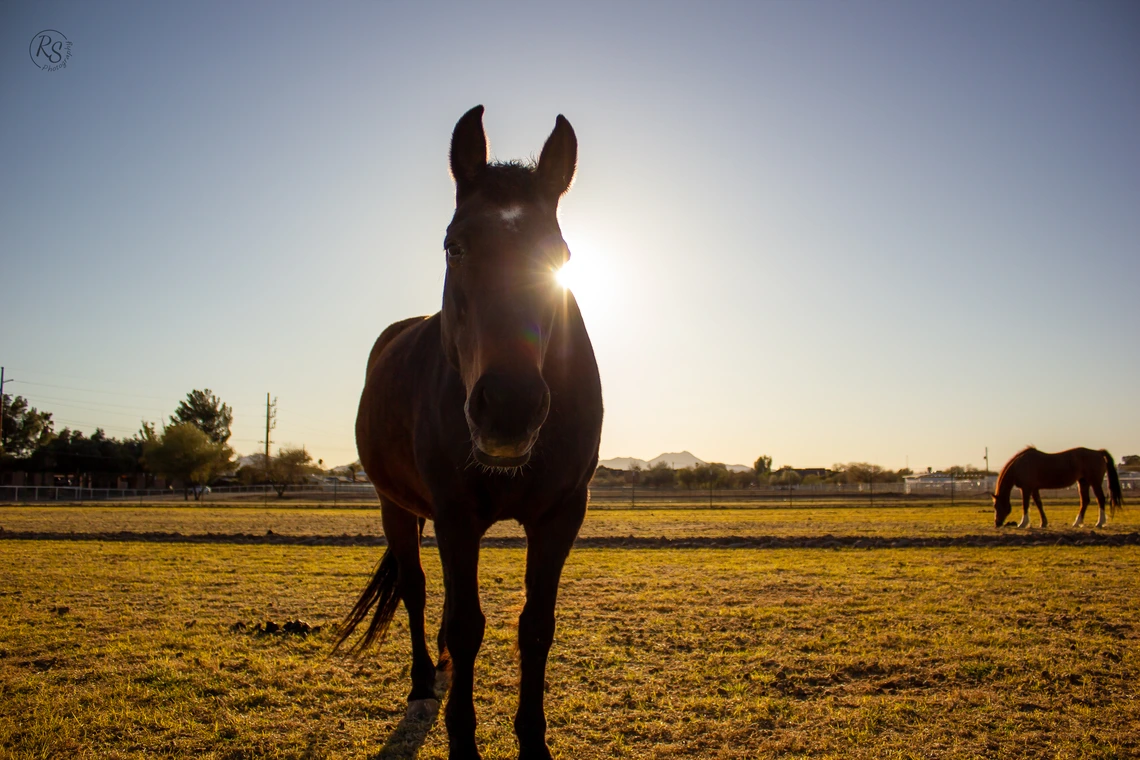
Rachael Sirek
The University of Arizona Campus Agricultural Center is home to the College of Veterinary Medicine’s teaching herd of horses, cattle, sheep, and even a friendly donkey named Churro, making our comprehensive veterinary education possible for our Doctor of Veterinary Medicine students. These dedicated ‘animal professors’ give our students hands-on opportunities to evaluate and apply their clinical knowledge and hone their animal handling capabilities. For a more in-depth insight into the ongoings at the Campus Agricultural Center, we recently spoke with Skyler Bentley, an Animal Care Manager at CAC, about our animals and the people responsible for their care.
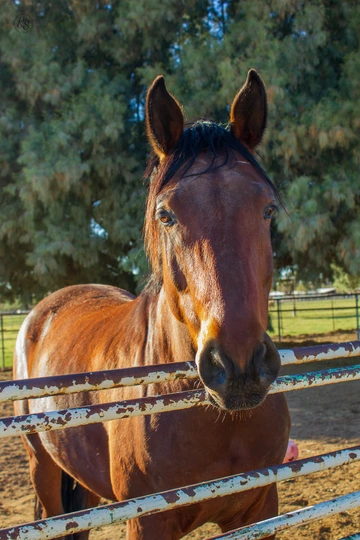
About our Animals
Our animals have come to the College as donations, acquired primarily through partnerships with our local community, with several joining us through partner veterinarians. When considering an animal addition to one of our herds, the College evaluates several factors, including the ability to accommodate the animal safely in our primarily outdoor open pasture facility. Animal Care Manager, Skyler Bentley, shared further information on our selection process, stating:
“All the animals that come in go through a veterinary panel to make sure they're a good fit for the program. [The panel determines] if they're healthy enough, whether their behavior is appropriate for students and whether they can participate in labs. We have to make sure everybody is comfortable, happy, capable of being out in social groups and outdoors and all that sort of thing.”
Our herd of over 20 horses is primarily composed of senior equines, who enjoy excellent veterinary care, food, and enrichment throughout their retirement years. Each horse has a unique personality known by our staff and students.
Retired dairy cows are another valued part of our CAC family. These ladies graze, socialize, and add personality to our pastures.
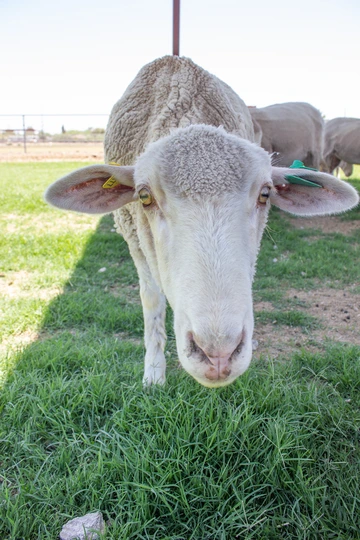
Our gentle sheep are patient teachers who help our students learn to serve animals of all sheeps and sizes.
Finally, our donkey, Churro the Burro, is another donation to the College of Veterinary Medicine. He is retired from his working life and ready to enjoy as much attention, cuddles, and hugs as possible.
Life on the Farm
From sunup to sundown, consistent care is built into the daily routines at CAC. Our horses, cows, sheep, and donkey receive regular attentive husbandry and veterinary care from a team of highly qualified professionals. Regulated by the Institutional Animal Care and Use Committee (IACUC) and the United States Department of Agriculture (USDA), our animal care team follows a careful routine designed to provide a high standard of welfare and care for our animals. Our animal care technicians walk the grounds of CAC at least twice daily to evaluate the enclosures and general welfare of every animal. If hazards become apparent, or an animal begins acting unusual, technicians note the encounter and follow a specific chain of command to address any emerging issues. The team works together to develop health care plans so no single person has the pressure of making decisions alone.
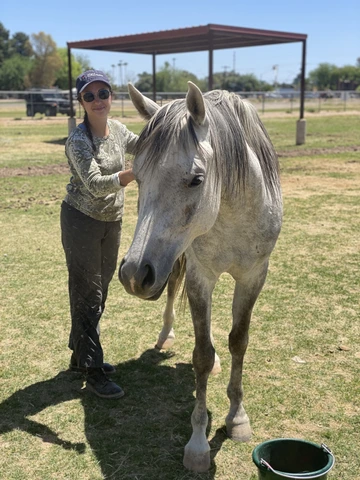
A typical morning at CAC begins early with feedings, quick wellbeing assessments, and fence checks. Once our animal care technicians are sure our animals are off to their best start, they begin other tasks. Each animal is regularly groomed and handled, ensuring that any health changes are immediately noted and addressed. During the warmer months, our animals regularly wear fly masks to help keep flies away from the sensitive parts of their faces. Other care protocols for maintenance are carried out as needed. Our sheep, for example, have their hooves trimmed every 12 weeks, often by current students learning basic husbandry. Horses will have their hooves trimmed periodically by a professional. Entertainment and fun are also essential elements of well-being. The diverse backgrounds of our animal care team ensure fresh ideas when regularly brainstorming ways to provide enrichment and stimulation through toys and activities to help our animals use their senses and gain novel experiences. Sensory experiences, such as placing scented objects in various areas of our pastures to discover, are common techniques for engaging our herd. Unexpected items, such as an industrial sweeper brush head for our cows to rub against, provide easy and safe solutions for entertainment. Similarly, you will find our horses playing with toys they can pick up and toss around such as jolly balls, which are rubber balls with handles, and large rubber traffic cones. During the warmer months, our animals will enjoy treats frozen in blocks of ice and opportunities for water play during bath time. “Baths in the summer keep everybody comfortable. The cows are not yet so fond of them, but they're warming up to the water a little bit. The horses love [baths] and will push each other out of the way to get to them. We have to rotate so everybody gets a chance,” shared Bentley.
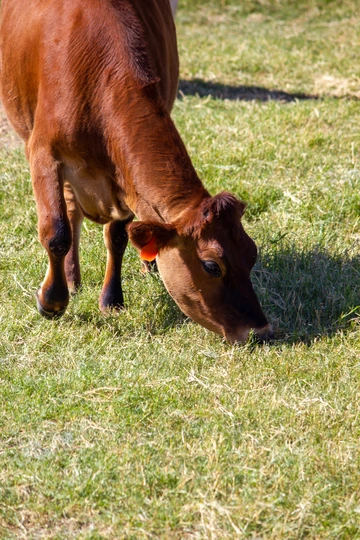
Our Staff
With a team of experienced veterinarians and technicians, our animals experience constant monitoring and care. Regular daily care is managed by our incredible animal care technician team, who all have extensive backgrounds in animal husbandry. Bentley shared,
“Some come from zoo backgrounds, some come from ranch backgrounds. But the thing that they all have in common is that they are all very well versed in husbandry. They have to have had positions where they’ve gotten to work with the basic daily maintenance of just seeing an animal every day, looking for signs of behavior that could indicate distress and knowing how to identify and record that.”
In addition to our excellent animal care technician team, our clinical skills team based at CAC partners to provide care and monitoring, and our University Animal Care and IACUC veterinary teams oversee any larger medical issues, ensuring our animals receive the highest quality of care. As Bentley notes, each team member at CAC “brings in a different piece of the puzzle,” allowing them to apply their unique backgrounds and specialties to provide excellent veterinary care for our animals and engaging educational experiences for students.
Our Students
Without our incredible and patient neigh-bors at CAC, students would not have the same opportunities to develop hands-on veterinary skills. Students first begin their clinical journey by developing vital skills using full-scale models and learning from presentations before moving on to live-animal interactions. It is one thing to learn about equine anatomy, for example, and quite another to put that knowledge into action on a restless horse. Bentley shared,
“There are certain things that you just need to know from looking at a live animal in terms of how to read a pain response or how to deal with agitation, for example. Also, sometimes things change in a direction you weren't expecting when you're doing a procedure and so it’s less controlled and more representative of what they are going to experience in the world. For many of our students, this may be the first time they get to be around these animals. So, it's about establishing [a level of] comfort and confidence with them.”
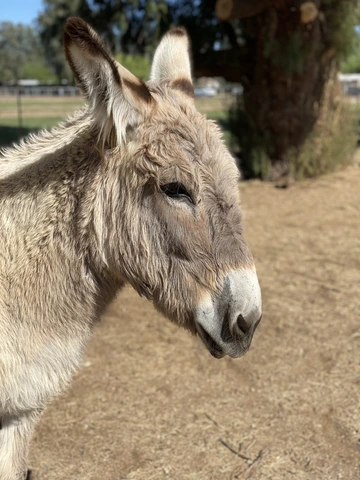
Some students have made exciting discoveries about their interests and goals during their time at CAC. Working with unfamiliar large animals has helped some students uncover new possibilities for specializing in a field they otherwise may not have considered. Bentley shared, “I've seen it a lot with our sheep because many students haven't had a lot of sheep experience in their lives. After doing some of our classes with them, they [realize], oh, I really like sheep. Maybe I want to include some small ruminants in my practice or simply learn more about them.” These discoveries widen our future veterinarians’ job prospects in the future because they can serve a wider animal population.
Access to our large animals means our students have invaluable opportunities to develop the qualities and skills they will call upon as highly qualified, day-one ready veterinarians. Experience with large animals helps all students develop reasonable expectations of themselves and the animals they serve. If an animal shies away, for example, students are prepared because they have encountered the behavior and know how to manage it. Large animal medicine is less controlled, so students benefit from real-world experience that helps them develop and trust their instincts.
Our origin as a land-grant university and our rich history of agriculture inform our understanding of how vital large animal medicine is to a healthy Arizona. Some students, eager to serve their own rural communities, are developing the skills and insights required daily for their future careers in large animal medicine. This robust background in large animal medicine will make our students confident, day-one-ready practitioners equipped to handle large animals, apply hard-won skills and serve communities of all kinds with the expertise they gain at CAC.
Teaching Herd Horse Sponsorship
Teaching herds are vital for educating and helping students build their clinical knowledge, mindful handling skills, and safe restraint while exploring and engaging topics in their curriculum. In addition, regular interaction with our horses teaches future veterinarians to observe, monitor, and provide excellent care for every stage of life. Your support can help provide food, shelter, and veterinary care for our valued animals and cultivate a new generation of rural and nonrural veterinarians with the necessary tools and confidence to support and partner with clients.
